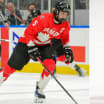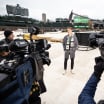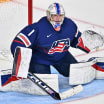As part of the NHL's celebration of Gender Equality Month, NHL.com will be featuring women in hockey throughout March. Today, Lindsay Artkin, who founded the National Hockey League Coaches' Association Female Coaches Development Program.
Female hockey coaches benefit from NHL counterparts' development program
Networking, mentorship opportunities aimed at getting 'way more women behind the bench'
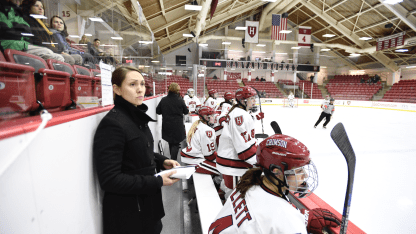
The text messages arrive every 10 days or so. There are occasional Zoom calls and group texts.
Jamie Kompon, the male associate coach of the Winnipeg Jets, and Cassie Turner, the female coach of the women's hockey team at Quinnipiac University, share ideas and thoughts and encouragement. They share their love of hockey and coaching. They share X's and O's. They share jokes.
It is exactly what Lindsay Artkin had hoped would happen.
Nearly two years ago, when Artkin looked out at a room in Vancouver dominated by male faces, an idea sprouted that would become the NHL Coaches' Association Female Coaches Development Program, a way to connect female coaches with their female counterparts, with male coaches in the NHL and AHL, and with potential job opportunities throughout hockey.
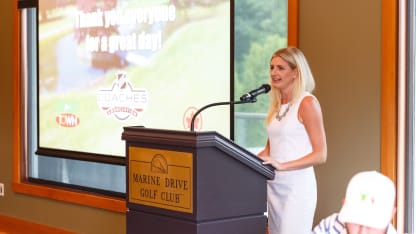
It was a way to develop the next generation of coaches at all levels and ensure that more of them might be female.
"When you look at the composition of coaches behind the NHL bench, it's very homogenous," said Artkin, the president of the NHLCA. "It's 100 percent male. It's almost predominantly white males. And it's not representative of coaches across the hockey community and definitely not across society in the world."
The development program debuted on International Women's Day, March 8, 2020, just before the world shut down because of COVID-19. Artkin pivoted, turning an in-person program into a virtual one, launching a four-week pilot version of the NHLCA Mentorship Program to involve women in the development program, taking advantage of the fact that so many of her coaches were stuck inside with little to do.
One year into the development program, relationships have formed and networks have started to take root through the hockey community, offering a boost for female coaches that includes professional development, the idea of furthering their careers and simple exposure.
Nowhere is that more evident than in the bond that Turner and Kompon have formed.
They met last May, when they teamed up for a presentation on practice planning as part the mentorship program. Turner started by presenting to the attendees of the virtual session, with Kompon following with feedback, before each would take questions.
Kompon was floored by Turner. He was supposed to critique her but, as he said, "There was nothing to critique about her. She was unbelievable."
They clicked.
"It's funny how people think it's just a one-way street," said Kompon, who brought some of Turner's ideas to coach Paul Maurice to potentially implement with the Jets. "But at the end of the day, I got more out of it than she could ever imagine."
Which gets back to the exposure. The visibility.
"What I hope that people are noticing is that female coaches are actually just as capable, if not more capable, than some men," said Lee-J Mirasolo, the associate coach of the Harvard women's team. "We know hockey. And I think that being visible in that light is hugely important for change to happen."
\\*
It was at the 2019 NHL Draft, where the NHLCA held its annual coaching symposium, that Artkin had that "aha" moment. She was about to begin the morning's remarks when she looked out over the sea of faces and was startled.
She remembers there were maybe five women in the crowd of 500.
So Artkin spent the next few months engaging with coaches, both male and female, asking for their support and suggestions as she fashioned the program.
It would include skills development, education, networking, leadership, communication strategies and exposure for 50 women in an effort to help advance their careers while fighting the prevalent misconception in hockey that men can coach both men and women, but women can only coach women.
To assemble the initial members of the program, Artkin searched through her networks, called NHL teams -- 21 of them nominated female coaches from their community -- and came up with women everywhere from the youth level to NCAA hockey, coaches with only a few years of experience to a three-time Olympic medalist (Meghan Duggan) and the 494-win coach at Harvard (Katey Stone). There are 54 women in the program, with plans to add more this summer.
"What I was hearing from [the female coaches] was that hockey is an old boys club and who you know is how you get that next role," Artkin said. "That's true of any industry -- it's not just hockey -- your network is really where your next opportunity is going to come from.
"But if there's 100 years of it being a homogenized group of individuals at those top levels, how do you build your network? How do you get those connections? … And for me that was almost comforting, because I'm like, well, this is great. I'm the president of the NHLCA. I've got nothing but hockey coaches."
Eligible members of the NHLCA are full-time NHL and AHL coaches, assistant coaches, goaltending coaches and video coaches.
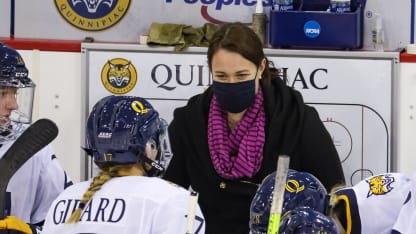
There are no women in any of those positions in the NHL. Emily Engel-Natzke, who became video coach of the Hershey Bears in October, is the sole female coach in the AHL. (She was a late addition to the development program.) There are other part-time coaches working with NHL teams, including Arizona Coyotes skating coach Dawn Braid and Chicago Blackhawks development coach Kendall Coyne Schofield, but they are not members of the NHLCA.
On the NCAA side, according to a study by the Tucker Center for Research on Girls & Women in Sport, 38.5 percent of Division I women's ice hockey teams in 2019-20 were coached by women.
The NBA, MLB and NFL have made inroads towards female coaches gaining permanent coaching jobs in major sports, starting with Becky Hammon of the San Antonio Spurs, the first full-time female NBA assistant.
This program aims to add hockey to that list.
\\*
When Todd Woodcroft was hired as coach of the men's team at the University of Vermont last April, he received more than 160 resumes for positions on his staff. Seven or eight were from women. He didn't think that was enough, so he sought out several more who hadn't applied, encouraging them to do so.
"That's probably a bigger indictment of the issue," Woodcroft said. "Like, do you not feel you have an opportunity? Do you not feel that you can compete at this level?"
He interviewed three women for jobs, with one of them, Mirasolo, advancing to the next stage of the process. And though Mirasolo did not take the job - she didn't believe that recruiting an entirely new pool of talent during a pandemic was the right choice - the fact that she was part of the process came directly from a relationship the pair had formed. Two years ago, Woodcroft gave a presentation at a college coaches convention in Florida, where it struck her that he included slides of female and male players and used both "he and she" pronouns.
Because of that, they had a rapport already. He trusted her, her judgment, her teaching, her ability to coach men.
"As a female coach in the sport, my goal is for there to be a day that I'm evaluated for every job on the men's side, just like every male is evaluated for every job I go after, which is currently the case," said Liz Keady Norton, associate coach of the Boston University women's team. "I think that men are looked at for both positions and women are looked at for the ones on the women's side and very few after that. I think that there have been a few steps taken in the last year or so that have pushed the case forward, but I would like to see a much bigger step taken in that direction."
That is the point. That is what Artkin wants.
She wants to look out on a crowd of 500 faces and see more than five women.
"It's who you know. So now that we've made those introductions, I think that will help expedite it," Artkin said. "I'd love for there to be way more women behind the bench. I'd hope it was next year. I don't know if we'll start to see it that quickly.
"But hockey is lagging behind the other professional sports. When you look at the NBA and MLB and NFL, there are already women there. So why not hockey too?"
And whether female coaches make it into the highest reaches of men's hockey sooner or later, the program is giving them a tremendous amount right now.
"If the Boston Bruins ever call me, I would be flattered and excited," Keady Norton said. "But if they don't, in the meantime, I feel like through the program I've become a better coach. And I'm excited about that."






